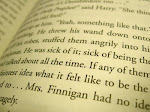In my reading and research of these books, I've found a sort of pattern in the sort of people who challenge and request to ban books. For starters, they're all parents who are trying to censor books their children have brought home from school- a place of learning and broadening the mind, at least for some people. With that said, you would think parents would put a bit more trust into the teacher's ability to instruct their children on how to read and interpret the messages of a given book. But that's not always the case.
I've gone as far as to separate these parents into groups, which I'll reference in many of my posts. There's the "If you ignore it, it isn't real" group, which tries to shield their children from some of the many horrors of the real world depicted in books including but not limited to rape, incest, drug abuse, violence and poverty. We'll call this group, Group A. It's tried to censor books such as The Lovely Bones by Alice Sebold, The Color Purple by Alice Walker and so on. (This group is a close relation to Group D, which I'll get to in a moment.)
Then there's Group B, the "If you read about it, you'll go out and do it" group, which has censored Go Ask Alice, Rainbow Boys by Alex Sanchez, etc. This group believes that the simple act of reading the books is going to incite teens to go out and do drugs or have raucous unprotected sex or become gay (which we all know is not something you randomly choose to be... or do we?). I guess they believe their own parenting is so faulty that a book is going to make their child do all these things, but I would never want to make that assumption.
Group C is the "This book offends people" group. Yes, there are some people who get offended by words and ideas, and that's completely understandable- I myself hate using those words. But these people don't get why the words are used in literature, and thus they move to censor the books that offend.
Group D, the "Only Write Happy Things" group (and a small one), is probably my favorite. See, they're under the delusion that life is just chock-full of daisies and sunshine and rainbows and all good things. Um, wrong. I separated this group from Group A because I felt that this one refuses to even acknowledge reality, whereas Group A at least admits it's somewhat present (though they still can't bear to let their children read about it).
Finally, Group E is the "We can't dare let our children read this book, even if they're 18 years old" group. They think that their kids aren't old enough/mature enough to handle explicit or offensive content. These are the people banning books I read in middle school from high school libraries. Again, well-meaning, but come on- I'm sure highschoolers are mature enough to handle the content in books like Midnight in the Garden of Good and Evil. (Especially if they're off watching the crap on television that they love so much.)
So those are the groups of people I have found who tend to ban and challenge books the most, because of what they find to be offensive language, racial slurs, promotion of certain behaviors such as homosexuality and drug use, and violence, among other things. Have they read the books? I doubt it. But they still wield considerable power as the parents of impressionable young children, and without them I wouldn't have this blog to write. So thank you, all you people out there who have ever moved to ban a book. You make this a very interesting endeavor for me.
Friday, March 19, 2010
Subscribe to:
Post Comments (Atom)





No comments:
Post a Comment